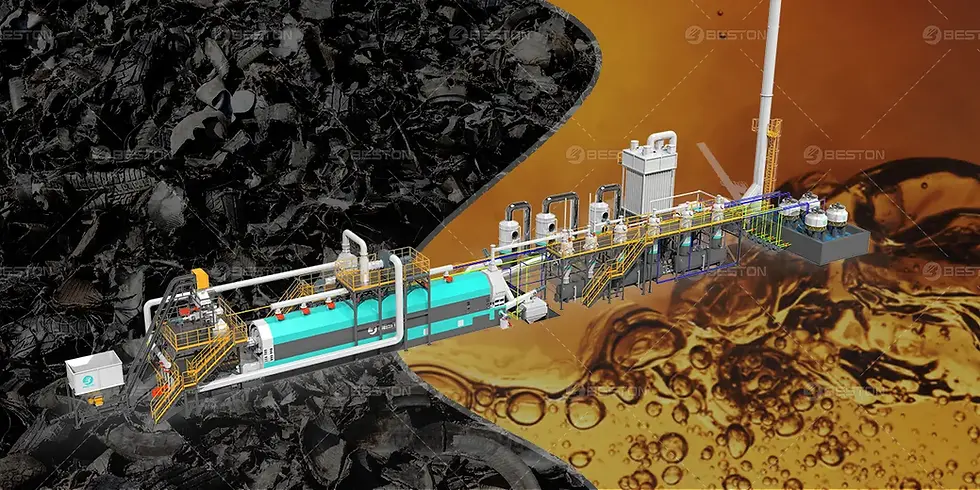Selecting the Right Pyrolysis Plant Manufacturer
- Aug 4, 2025
- 3 min read
Choosing the right manufacturer for a pyrolysis plant is a critical decision for businesses looking to invest in waste-to-energy solutions or material recycling. A well-designed pyrolysis plant can significantly enhance productivity, reduce waste, and contribute to sustainability goals. However, selecting a manufacturer requires careful consideration of various factors, including technology, reliability, cost, and after-sales support. This article outlines key criteria for selecting a pyrolysis plant manufacturer, ensuring that companies make informed decisions that align with their operational needs and long-term goals.
Technological Expertise and Innovation
The first criterion to consider when selecting a pyrolysis plant manufacturer is their technological expertise. Pyrolysis is a complex process that requires advanced systems for controlling temperature, feedstock handling, and product separation. Manufacturers who invest in research and development and continuously innovate are more likely to provide cutting-edge solutions that optimize the pyrolysis process. This can lead to higher yields, more efficient energy consumption, and improved product quality.
Look for manufacturers that utilize state-of-the-art technologies, such as advanced catalytic pyrolysis or modular reactor designs. These technologies can enhance the flexibility and scalability of a pyrolysis plant, allowing it to process different feedstocks efficiently and adapt to future market demands.

Proven Track Record and Reputation
A manufacturer’s track record and reputation in the industry are vital indicators of their reliability and the quality of their products. A well-established manufacturer with a history of successful projects will typically offer more assurance regarding the performance of their pyrolysis reactor. They will have a proven ability to meet deadlines, deliver high-quality systems, and offer robust support services.
Before making a decision, it’s essential to research the manufacturer's past projects, client testimonials, and case studies. Reach out to businesses that have previously worked with the manufacturer to gain insights into their experience with installation, operation, and maintenance.
Customization and Flexibility
Not all pyrolysis plants are created equal, and different operations may require specialized features depending on the type of feedstock, desired end products, and production capacity. A reputable manufacturer should be able to offer customized solutions tailored to your specific needs.
Customization may include adjustments to reactor size, material handling capacity, energy recovery systems, or emission control technologies. Manufacturers who offer a flexible design process and collaborate closely with clients to create a tailored pyrolysis plant will provide a more effective solution, reducing operational inefficiencies and increasing the plant's profitability.
Regulatory Compliance and Environmental Standards
Regulatory compliance is a crucial factor when choosing a pyrolysis plant manufacturer. A manufacturer should ensure that their systems comply with local and international environmental regulations. This includes adherence to emissions standards, waste management protocols, and energy efficiency requirements.
In regions where environmental protection laws are stringent, such as the European Union or North America, manufacturers with certifications like ISO 14001 (Environmental Management) or CE certification will be more likely to offer systems that meet or exceed compliance standards. These certifications guarantee that the pyrolysis plant operates with minimal environmental impact, ensuring that businesses avoid regulatory penalties and align with sustainability goals.
After-Sales Support and Maintenance Services
After-sales support is another critical aspect of selecting the right manufacturer. Pyrolysis plants are sophisticated systems that require regular maintenance and occasional troubleshooting. A manufacturer who provides comprehensive after-sales services, such as training, technical support, and spare parts availability, will ensure the smooth operation of the plant over its lifetime.
Look for manufacturers who offer warranties, remote monitoring capabilities, and on-site maintenance support. These services help minimize downtime and prevent production disruptions, which can result in significant cost savings in the long term.
Cost Considerations
While cost should never be the sole factor when selecting a pyrolysis plant manufacturer, it remains a critical consideration. A cost-effective pyrolysis plant is one that delivers value over time. This involves considering the total cost of ownership, including installation, operation, maintenance, and energy consumption.
Request detailed cost breakdowns from potential manufacturers, and ensure that they offer transparent pricing without hidden fees. It’s also important to assess the long-term savings that the plant will provide, such as reduced waste disposal costs, energy recovery, and the sale of by-products like fuel, carbon black, and gas. A higher initial investment in advanced technology may lead to lower operational costs and higher returns in the future.
Scalability and Future-Proofing
Investing in a pyrolysis plant is a long-term commitment, so it’s essential to choose a manufacturer that offers scalable solutions. As your business grows, your pyrolysis needs may evolve, requiring a plant that can scale up to handle increased feedstock or accommodate new waste streams. Manufacturers should offer modular designs or upgradable systems that allow for easy expansion and integration with future technologies.
Furthermore, a forward-thinking manufacturer will consider future trends, such as the increased adoption of renewable energy or the development of more efficient catalysts. These forward-looking features ensure that the pyrolysis plant remains relevant and competitive in an ever-changing market.




Comments